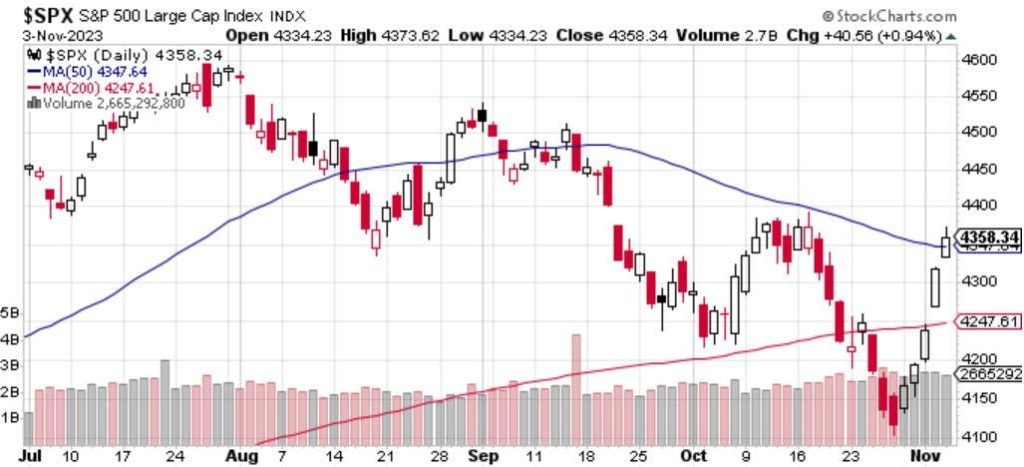Markets last week performed like a long-bedridden flu patient who finally broke their fever and started feeling fine enough to dance. Multiple catalysts contributed to the biggest weekly drop in long-term interest rates since mid-March that sprung stocks out of a monthlong slump.
The bounceback rally sent the S&P 500 Index 5.95% higher for the week and back above its 50-day moving average. Every sector posted gains, ranging from 9.3% for telecommunications services to 2.4% for the energy sector, which was pressured by crude oil’s 5.9% decline to a two-month low of $80.51 per barrel. Real estate (+8.7%) and financials (+7.4%) were also big beneficiaries of falling bond yields. In terms of size, small stocks were in the sweet spot: the Russell 2000 Small Cap Index surged 7.6% on the week.
On Wednesday, the much-anticiapted Treaury’s quarterly refunding statement revealed that the U.S. government would be borrowing much less in coming months than had been expected. In response to projections for less plentiful debt issuance, longer-term rates came down in large amounts. The yield on the 10-year U.S. Treasury note, which touched 5% two weeks ago, finished the week at 4.56%.
Short-term rates—heavily influenced by central bank policy—also fell. The Federal Open Market Committee did as expected and did not hike the federal funds rate on Wednesday at its latest policy meeting. Fed Chairman Jerome Powell afterward made dovish comments about future rate hikes, emphasizing that the FOMC would be sensitive to incoming inflation data, which has trended lower in recent months. Short-term rates retreated, and interest rate futures traders now price in a 1.25-percentage point cut in the fed funds rate by the end of 2024.
Finally on Friday, the monthly nonfarm payrolls report showed 150,000 jobs created in October, short of expectations for 170,000, giving extra fuel to the week’s stock market rally.
Among dividend-focused funds, real estate investment trusts tracked by the ICF
ICF
(+8.3%), and especially mortgage REITs tracked by FDI portfolio holding REM (+13.4%), were the biggest winners. Small cap dividend-payers (DES
DES
+7.3%) were ascendant in terms of size. High-dividend yield funds outpaced dividend growth.
FDI Portfolio Action: The Forbes Dividend Investor portfolio of 35 stock gained an average of 6.54%, led by iShares Mortgage Real Estate (REM +13.4%). Banks and REITs like Columbia Banking System (COLB +13.3%) and Boston Properties
BXP
(BXP +12.4%) and Ames National (ATLO +11.9%) were also outperformers.
Dividend-growth superstar Qualcomm
QCOM
(QCOM +12.3%) reported earnings and jacked up year-end forecasts for revenue and profit. The mobile chip designer giant has hiked the dividend 10% annually over the past 10 years.
The only FDI portfolio stock to lose ground was Milwaukee-based snow plow and dump truck outfit Douglas Dynamics (PLOW -2.7%), punished on Tuesday after providing a reduced full-year financial outlook. We are emboldened to keep the stock based on insider activity like CEO Robert McCormick’s $307,000 purchase in September at $30.71 per share.
Click here for immediate access to all 35 stocks in the Forbes Dividend Investor portfolio with your trial subscription.
Buying Call Options On Stocks You Sell Can Ameliorate Seller’s Remorse
When you’re a value investor who picks stocks based on attractive fundamentals, it can be frustrating when the market fails to appreciate your analysis and keeps on thrashing a stock that already looks cheap. This was the case one month ago with two stocks that we ditched, but on which we purchased call options in order to participate in any subsequent rebound. So far, so good with that strategy.
Outdoor advertising REIT OUTFRONT Media
OUT
looked extremely cheap and oversold, but rather than hanging on to this falling knife, I proposed purchasing $10 March 15 calls for $0.35 apiece. On Friday afternoon, those calls were bid at $2.20.
Similarly with Gray Television
GTN
, rather than hanging on to the stock, we purchased $7.50 May 17 calls for $0.60 apiece. The most recent bid on these calls is $1.35.
John Dobosz is editor of Forbes Dividend Investor, Forbes Premium Income Report, and Forbes Billionaire Investor.
Read the full article here




